Oro Valley Catholic
“If other ages felt less, they saw more, even though they saw with the blind, prophetical, unsentimental eye of acceptance, which is to say, of faith. In the absence of this faith now, we govern by tenderness. It is a tenderness which, long cut off from the person of Christ, is wrapped in theory. When tenderness is detached from the source of tenderness, its logical outcome is terror. It ends in forced-labor camps and in the fumes of the gas chamber.” - Flannery O’Connor, A Memoir of Mary Ann
Episodes

Friday Feb 10, 2023
Friday Feb 10, 2023
This week on OVC, Fr. John discusses Benjamin Libet's experiment on the brain that has been used to argue against human free will. Are we completely free? What about involuntary and non-voluntary acts? What does this have to do with our capacity for science and a life of faith. Listen to the discussion on OVC and what free will means and doesn't mean for a human being.
The readings for the 6th Sunday of Ordinary Time can be found here:
https://bible.usccb.org/bible/readings/021223.cfm
Pizzetti - Dies irae - Messa di Requiem by The Tudor Consort is licensed under a Attribution 3.0 International License.
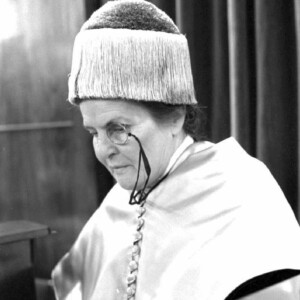
Friday Feb 03, 2023
Friday Feb 03, 2023
The Sermon on the Mount calls us to be salt, light and a city on a hill. In this episode I will discuss the Sermon on the Mount, the famous philosopher Elizabeth (G.E.M.) Anscombe and what it means to be a metaphysical animal infused with the sanctifying grace of God. How does Christ direct the purpose of moral action and the meaning of human existence.
Anscombe's obituary in The Guardian after her death in 2002 said about her opposition to honoring Harry St. Truman,
"Two years earlier, in 1956, she had demonstrated in a very practical way her opposition to consequentialism. When it was proposed that Oxford should give President Truman an honorary degree, she and two others opposed this because of his responsibility for the bombing of Hiroshima and Nagasaki. Although overruled, they forced a vote, instead of the customary automatic rubber-stamping of the proposal. "For men to choose to kill the innocent as a means to their ends is always murder," declared Anscombe's pamphlet, Mr Truman's Degree. It sarcastically condoled with the Censor of St Catherine's for having to make a speech "which should pretend to show that a couple of massacres to a man's credit are not exactly a reason for not showing him honour". Elizabeth Anscombe -An exhilarating philosopher, she took to sporting a monocle and smoking cigars , Guardian (UK)
Book: Metaphysical Animals: How Four Women Brought Philosophy Back to Life - Kindle Edition by Clare Mac Cumhaill (Author), Rachael Wiseman (Author)
Readings for the Fifth Sunday of Ordinary Time: https://bible.usccb.org/bible/readings/020523.cfm
Music: Clarinet Quintet in A Major, K. 581 (Mozart) by Musicians from Marlboro is licensed under a Attribution-NonCommercial-NoDerivatives (aka Music Sharing) 3.0 International License.
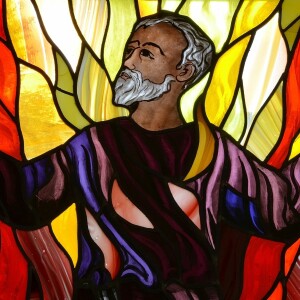
Friday Jan 27, 2023
Friday Jan 27, 2023
In Genesis 12: 1-3 God promises Abram, soon to be Abraham, "The LORD said to Abram: Go forth* from your land, your relatives, and from your father’s house to a land that I will show you. I will make of you a great nation, and I will bless you; I will make your name great, so that you will be a blessing. I will bless those who bless you and curse those who curse you. All the families of the earth will find blessing in you." In Matthew 5, the Sermon on the Mount, Abram's descendant Jesus of Nazareth begins to teach, "Blessed are the poor in spirit, their's is the Kingdom of God," There is the Kingdom of God again and God can take one off his bucket list!
Readings for the 4th Sunday in Ordinary Time: https://bible.usccb.org/bible/readings/012923.cfm
Music: Rejoice Handel - Rejoice by Advent Chamber Orchestra is licensed under a Attribution-Share Alike 3.0 United States License.

Thursday Jan 26, 2023
Thursday Jan 26, 2023
How to evangelize your parish with the Word of God? Meg R. discusses her experience starting a bible study program in her parish.
Can't Keep My Eyes Open by The Paperhead is licensed under a Attribution-Noncommercial-No Derivative Works 3.0 United States License.

Friday Jan 20, 2023
Friday Jan 20, 2023
Matthew's Gospel quotes Isaiah 8 "First the Lord degraded the land of Zebulun and the land of Naphtali; but in the end he has glorified the seaward road, the land west of the Jordan, the District of the Gentiles." What is God's response? He sends his Son there first. Why does Jesus talk about the kingdom of Heaven in a land that has experienced such misery?
Readings: https://bible.usccb.org/bible/readings/012223.cfm
Music by St. Mark Choir under license for podcasting from One License A-726294

Friday Jan 13, 2023
Friday Jan 13, 2023
The readings for the Second Sunday in Ordinary Time are about the old world giving way to the New Creation. We are called to be fellow workers with Christ, the gardener of the New Creation.
Readings: https://bible.usccb.org/bible/readings/011523.cfm
Music by St. Mark Choir pursuant to OneLicense for Podcasting A-726294
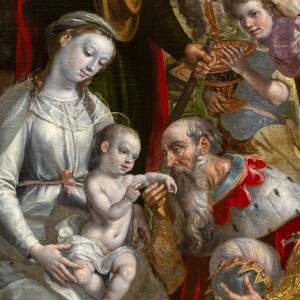
Friday Jan 06, 2023
Friday Jan 06, 2023
The Story of the Magi from the east is an echo of the ancient, pagan world. We take Christian history for granted and forget the power of the ancient, pagan world and the influence of the East on the Western World. A good example is that the ancient Babylonians named the weekdays after the five planetary bodies known to them and the other two days they dedicated to the Sun and Moon (Sunday and Monday).
The Jews, of course, explained the seven days of the week differently. The Romans followed the Babylonian example, not the Jewish, and the Emperor Constantine established the seven-day week in the Roman calendar in 321 A.D. designating Sunday and Monday as the first two days of the week. The names of our days of the week came later in European history. The other English weekday names were derived from Anglo-Saxon names for gods from Teutonic mythology. Tuesday comes from Tiu, or Tiw, the Anglo-Saxon name for Tyr, the Norse god of war. Tyr was one of the sons of Odin, or Woden, who in turn gave his name to Wednesday. Thursday originates from Thor, the god of thunder. Friday is derived from Frigga, the wife of Odin, representing love and beauty. Saturday comes from Saturn, the ancient Roman god of fun and feasting. We kept Sunday in honor of the Sun and Monday in honor of the moon. The echoes of the pagan world are all around us.
A blast from the past. This episode played three years ago.
The Feast of the Epiphany celebrates the mass conversion of the pagan world to the God of Abraham, Isaac and Jacob. The worship of the Creator, not the created.
Readings: https://bible.usccb.org/bible/readings/010823.cfm
The music is licensed under One License and is performed by the St. Mark Choir.
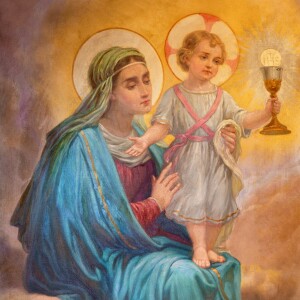
Sunday Jan 01, 2023
Sunday Jan 01, 2023
This is the homily delivered by Fr. John on New Year's Day 2023.
Readings: https://bible.usccb.org/bible/readings/010123.cfm
Music by St. Mark Choir, pursuant to One License # A-726294
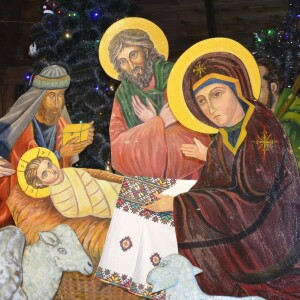
Friday Dec 23, 2022
Friday Dec 23, 2022
C.S. Lewis wrote his book, "Miracles" to defend the work of God in the world against Naturalists, that is thinkers who limit reality to only what can be observed by the five senses. What makes the miracle of the Incarnation particularly bothersome, "“An 'impersonal God'-well and good. A subjective God of beauty, truth and goodness, inside our own heads-better still. A formless life-force surging through us, a vast power which we can tap-best of all. But God himself, alive, pulling at the other end of the cord, perhaps approaching at an infinite speed, the hunter, King, husband-that is quite another matter.” ― C.S. Lewis, Miracles
Today on Oro Valley Catholic we are going to discuss C.S. Lewis reflections on the greatest miracle of all - the Incarnation.
Readings: https://bible.usccb.org/bible/readings/122522-vigil.cfm
Music: "The Holly and the Ivy" performed by the St. Mark Choir pursuant to OneLicense # A-726294
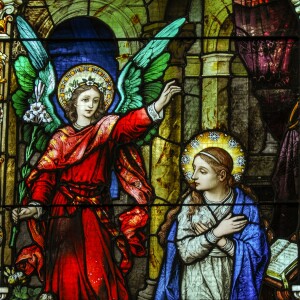
Friday Dec 16, 2022
Friday Dec 16, 2022
How to understand the Christian concept of God versus the pagan gods. Pope Benedict XVI (emeritus) wrote "Jesus of Nazareth: The Infancy Narratives." In it he discusses the difference between mythic conceptions of divine birth, like the rape of Europa by Zeus and the Matthean and Lukan accounts of the virgin birth. Comparing the two, he focuses on how differently the divine is understood. He writes, "The difference between the concepts involved is so profound that one really cannot speak of true parallels. In the Gospel accounts, the oneness of the one God and the infinite distance between God and creature is fully preserved. There is no mixture, no demi-god. It is God’s creative word alone that brings about something new. Jesus, born of Mary, is fully man and fully God, without confusion and without. " Pope Benedict XVI. Jesus of Nazareth: The Infancy Narratives . The Crown Publishing Group. Kindle Edition.
We will explore this and more on Oro Valley Catholic for the Fourth Sunday of Advent.
Readings: https://bible.usccb.org/bible/readings/121822.cfm
Music by the St. Mark Choir pursuant to One License for podcasting, # A-726294





